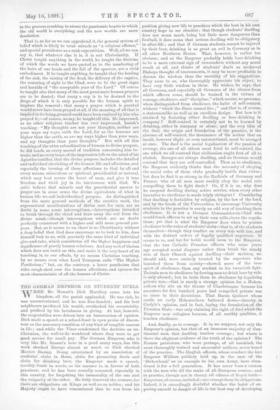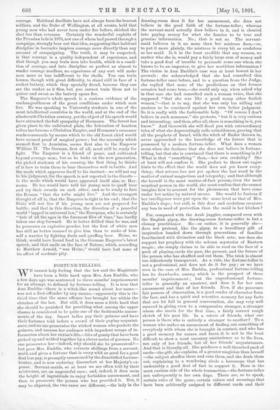THE GERMAN EMPEROR ON STUDENTS' DUELS.
WHEN Mr. Besant's Dick Mortiboy came into his kingdom, all the parish applauded. He was rich, he was unconventional, and he was free-handed; and his best neighbours pardoned his wealth, overlooked his eccentricity, and profited by his lavishness in giving. At last, however, the respectables were driven into an insurrection of opinion. Dick made a speech at a school-feast in open praise of discon- tent as the necessary condition of any kind of tangible success in life ; and while the Vicar condemned the doctrine as un- Christian, the well-to-do wondered where they were to get good service for small pay. The German Emperor, who is very like Mr. Besant's hero in a good many ways, has this week shocked Europe almost as much as Dick shocked Market Basing. Being entertained by an association of students' clubs in Bonn, clubs for promoting duels and clubs for drinking beer, the Emperor made a speech, terribly frank in words, as his manner is, in favour of both practices ; and he has been roundly censured, especially in this country, for forgetting the immorality of the one and the vulgarity of the other, He fully deserved the censure, for there are obligations on Kings as well as on nobles ; and his Majesty ought to have remembered that he was from his position giving new life to practices which the best in his own country hope to see obsolete ; that though students' duelling does not mean much, being but little more dangerous than football, it does mean that serious duelling will be obligatory in after-life ; and that if German students cannot be injured by their beer, drinking is as great an evil in Germany as in all other Northern States. That, however, is rather too obvious ; and as the Emperor probably holds beer-drinking to be a mere external sign of camaraderie without any moral result at all, and thinks of students' duels as mediaeval Bishops thought of tournaments, it may be more profitable to discuss the wisdom than the morality of his suggestions. They seem to us, who thoroughly appreciate his object, to have very little wisdom in them. He wishes, he says, that all Germans, and especially all Germans of the classes from which officers come, should be trained in the virtues of courage, obedience, and " discipline," which means, we presume, when distinguished from obedience, the habit of self-control, without " which the State cannot live ; " and that is, of course, a statesmanlike as well as an excellent design. But how is it attained by fostering either duelling or beer-drinking in company ? Self-control is certainly not to be learned by drinking, either in company or alone; and the very idea of the duel, the origin and foundation of the practice, is the absence of self-control, the dominance of the notion that an insult, however slight, or even unintentional, must be avenged at once. The duel is the social legalisation of the passion of revenge, the one of all others most fatal to self-control, the one which we all contend that civilisation ought first of all to abolish. Savages are always duelling, and no German would contend that they are self-controlled. Then as to obedience, the Emperor evidently thinks that the necessity of obeying the social rules of these clubs gradually instils that virtue; but does he find it so strong in the Radicals of Germany and France, who of all men most readily obey the social rule compelling them to fight duels P Or, if it is so, why does he suspend duelling during active service, when every other incentive to obedience is made triply stringent P Considering that duelling is forbidden by religion, by the law of the land, and by the heads of the Universities, to encourage University students in the practice is surely an odd way of teaching theM obedience. It is not a German Commander-in-Chief who would teach officers to set up their own wills above the regula- tions ; yet that is what the Emperor does when he praises obedience to the rules of students' clubs—that is, of the students themselves—though they conflict on every side with law, and with the distinct orders of legally qualified superiors. It seems to us, and but for habit would seem to the Emperor, that the two Catholic Prussian officers who some years ago accepted social disgrace rather than break the steady rule of their Church against duelling—their motives, we should add, were entirely trusted by the superiors who banished them from society—showed more of the true spirit of obedience than any student in his twentieth fight. To train men to obedience by forcing men to drink beer by rule, is only absurd ; but to train them to obedience by legalising private war,—that is surely a strange opinion for a Hohen-
zollern who sits on the throne of Charlemagne because his ancestors for five hundred years had compelled private war to cease in their dominions. That Baron Quitzow whose castle an early Hohenzollern battered down—thereby in Carlyle's opinion, and in fact, laying the foundation of the Prussian State —was only claiming the right of duel which the Emperor now eulogises because, of all earthly qualities, it teaches obedience.
And, finally, as to courage. It is, we suppose, not only the Emperor's opinion, but that of an immense mujority of Con- tinental men, that duelling teaches courage ; but where is there the slightest evidence of the truth of the opinion P The Roman patricians, who were perhaps, of all mankind, the most thoroughly trained and successful soldiers, never heard of the practice. The English officers, whose conduct the late Emperor William. publicly held up, in the case of the Birkenhead,' as an example to his own Army, have aban- doned it for a full generation. It has never been a custom with the men who fill the ranks of all European armies ; and in practice, though not in theory, all officers of Royal birth-- Emperors, of course, ineluded—arc exempt from its obligations. Indeed, it is exceedingly doubtful whether the habit of ex- posing oneself to danger of life is the best way of developing
courage. Habitual duellists have not always been the bravest soldiers, and the Duke of Wellington, at all events, held that young men who had never been under fire before, shirked the shot less than veterans. Certainly the wonderful exploits of the Prussian lads in 1870, not one of whom had passed through a campaign, strongly bear out that idea, suggesting that habitual discipline in barracks inspires courage more directly than any amount of campaigning. The truth, it may be suspected, is that courage is a quality independent of experience, and that though you may train men into health, which is a condi- tion of courage, and into discipline so perfect as almost to render courage needless, no experience of any sort will make men more or less indifferent to the shells. You can train horses, though with great difficulty, to stand still in face of a rocket-battery, which they specially dread, because they can see the rocket as it flies, but you cannot train them not to quiver and sweat as the battery opens fire.
The Emperor's whole speech is a curious evidence of the unchangeableness of the great conditions under which men live. He was speaking to University students in one of the most intellectual countries in the world, and at the end of the nineteenth Christian century, yet the object of his speech would have attracted the full sympathy of Hermann. The forest has given place to the cultivated plain, the federation of heathen tribes has become a Christian Empire, and Hermann's successor sends commands by means which to the old forest chief would have seemed proof of magical power; but the necessity which seemed• first to Arminius,, seems first also to the Emperor William II. The German, first of all, must still be ready for fight. The Emperor is a friend of peace, and cultivated beyond average men; but as he looks on the new generation, the picked students of his country, the first thing he thinks of is how to train them to bear themselves well in battle. And the mode which approves itself to his instinct—we will not say to his judgment, for the speech is not reported in the Gazette— is the mode which would have approved itself also to Her- mann. He too would have told his young men to quaff beer and try their swords on each other, and so be ready to face the Roman "that the tribe might live." And the strangest thought of all is, that the Emperor is right in his end; that the State will not live if his young men are not prepared for battle ; and that in this direction, the direction of a peaceful world " lapped in universal law," the European, who is certainly " heir of all the ages in the foremost files of time," has hardly taken one step forward. He is better drilled than he was, and he possesses an explosive powder, but the first of white men has still no better counsel to give him than to make of him- self a warrior by fighting duels and quaffing beer. Heine, we think, would have found food in the German Emperor's latest speech, and that smile on the face of Nature, which, according to Matthew Arnold, " was Heine," would have lost none of its effect of sardonic pity.



































 Previous page
Previous page